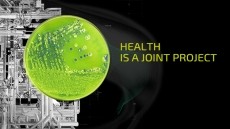Blast off for vaccine research in space
NASA shuttle containing an experiment for development of a
Salmonella vaccine.
On board the 14 day mission is a vaccine which was selected from hundreds of strains in a prior launch in March, as well as a supply of worms for testing. The researchers believe that the conditions in space, particularly the microgravity, provide a superior environment for the development of a Salmonella vaccine. Dr Jeanne Becker, chief science officer at BioSpace Technologies, said: "We are using the microgravity environment as a tool to grow cells in space that provides enhanced conditions to identify valuable vaccine targets." Becker went on to say that research into a Salmonella vaccine on Earth had always been inhibited by the speed at which the bacterium's virulence dissipates. This left too little time to develop an effective treatment but space appears to offer a solution. Research conducted in September 2006 showed that the microgravity in space caused salmonella's potency to triple, giving researchers a bigger window in which to genetically manipulate a strain with potential for vaccine development. The promise shown by such research prompted Space Florida and BioSpace Technologies to form a partnership to perform biotech research, which they believe could ignite the field of space based research. NASA has claimed the area has potential, telling congress in May 2007 that microgravity could benefit the fields of molecular biology, tissue culturing, bone demineralization, antibiotics production and plant genetics. The International Space Station (ISS) is the most suitable space for such research and has been utilised by governmental institutions and universities since 2000. In addition, since 2005 part of the ISS has been designated a National Laboratory for use by the private sector for research, development and industrial processing. However, uptake has been limited, with NASA itself acknowledging that "increasing the frequency and predictability of access to space has proven to be a necessary requirement for success". This has been constrained by NASA's desire to complete the ISS by 2010 but it has stated that its $500m investment in commercial orbital transportation services should remedy the situation. With this in place Space Florida's ambition of "establishing a space-based, biotech corridor that stretches from the International Space Station to the Space Life Sciences Lab at NASA (Florida)" could make the small step out of the realm of science fiction and into reality.



















